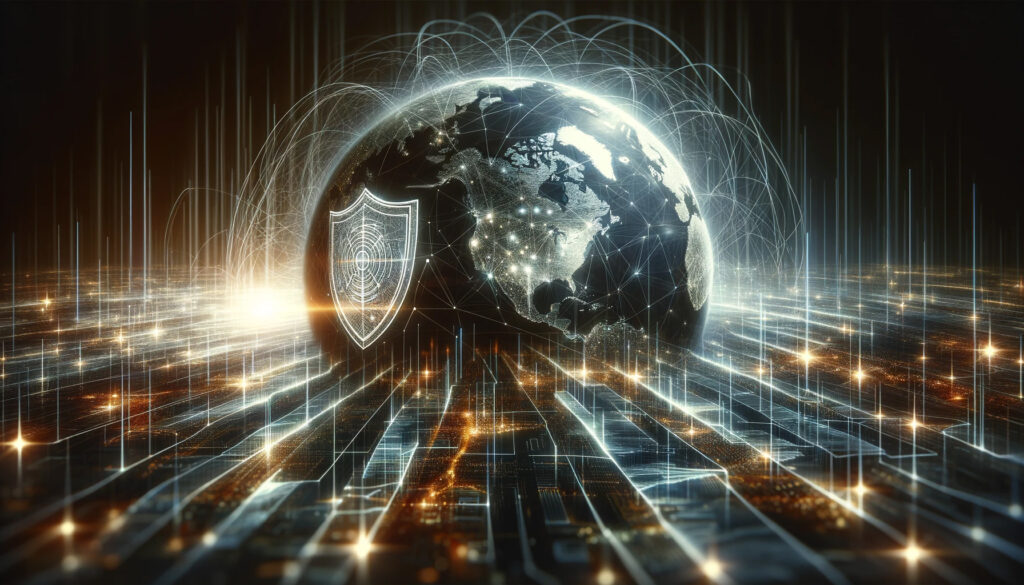
Abstract representation of cybersecurity, focusing on the themes of digital defense and global connectivity – DALL-E
In an era where digital warfare has become as critical as physical combat, the United States finds itself on the brink of a potential crisis that could dwarf any traditional military confrontation. FBI Director Christopher Wray’s recent testimony to the House Select Committee on the Chinese Communist Party served as a chilling reminder of the looming threat poised by Chinese hackers, capable of unleashing chaos and real-world harm upon American soil.
Wray’s stark warning highlighted a grave concern: “China’s hackers are positioning on American infrastructure in preparation to wreak havoc and cause real-world harm to American citizens and communities, if or when China decides the time has come to strike.” This ominous statement underscores a pivotal moment in the cyber arms race, signaling a shift towards a new battlefield where water treatment facilities, electrical grids, and oil and gas pipelines become prime targets for disruption.
The capability of Chinese government-backed hackers to compromise and potentially take down critical infrastructure is not just a theoretical risk but a clear and present danger. The hackers, according to Wray, are meticulously working to “find and prepare to destroy or degrade the civilian critical infrastructure that keeps us safe and prosperous.” This scenario is not merely about data breaches or financial loss but a direct threat to the physical safety and well-being of every American.
Despite these warnings, the Chinese government has consistently denied any involvement in hacking activities. However, the sincerity of these denials is questioned by U.S. officials, especially in light of recent diplomatic efforts to ease tensions between the two superpowers. The assurances from Chinese President Xi Jinping regarding non-interference in U.S. elections do little to alleviate concerns about the broader spectrum of cyber espionage and sabotage.
The revelation that Chinese cyber actors are exploiting basic flaws in U.S. technology infrastructure adds another layer of complexity to the threat. Jen Easterly, head of the U.S. Cybersecurity and Infrastructure Security Agency, criticized the inherent vulnerabilities in the systems underpinning America’s critical infrastructure, attributing them to decades of negligence where speed and features were prioritized over security.
This cybersecurity crisis calls for an urgent and robust response from federal law enforcement and the broader U.S. government. Recent efforts by the Justice Department and FBI to mitigate the impact of Chinese cyber campaigns, including removing malicious code from critical devices, represent steps in the right direction but also highlight the depth of the challenge.
The persistent nature of this threat, as FBI Director Wray and NSA head Gen. Paul Nakasone emphasized, demands constant vigilance and a strategic rethink of America’s cybersecurity posture. The numerical advantage of Chinese cyber operatives over FBI agents, estimated by Wray as at least 50 to 1, paints a daunting picture of the scale of the challenge ahead.
Beyond the realm of technology, China’s strategy extends to targeting the very fabric of American society, aiming to “silence, coerce, and threaten our citizens and residents.” This multifaceted approach to undermining U.S. power and influence underscores the complexity of the threat landscape and the need for a comprehensive and coordinated response.
As the United States navigates this treacherous cyber terrain, the imperative for strengthening cyber defenses, holding malicious actors accountable, and safeguarding the nation’s critical infrastructure has never been more acute. The specter of Chinese hackers turning the lights off across America is a scenario that could transition from hypothetical to reality with devastating consequences. The time to act is now, lest we find ourselves unprepared for the cyber onslaught that could redefine modern warfare and disrupt the lives of millions.








